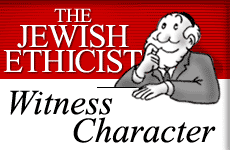 Vampire Weekend's Surprising Jewish Stories
Vampire Weekend's Surprising Jewish Stories


4 min read
3 min read
4 min read
5 min read
Does an expert witness have to be impartial?
Q. Much of my income as a real estate appraiser comes from testifying as an expert witness. The litigants who hire me expect me to give low appraisals which will help them in court, and they'll stop hiring me if I don't meet their expectations. Can I tailor my testimony to the needs of my clients? JF
A. In order to answer your question, we have to clarify a critical distinction. There is a big difference between a litigant or party to a trial and a witness in a trial. Everyone understands that the litigants are not impartial, and that their claims may be carefully crafted to help their case in court. But a witness is expected to provide only facts, and to be completely impartial.
Ideally, even claims of the litigants should only reflect objective fact, or at least reasonable and defensible claims. The Torah warns the judge to "Distance yourself from falsehood" (Exodus 23:7); the Talmud explains that in order to maintain this "distance" the parties to a lawsuit must help the judge by making only factual claims, even if a fraudulent claim is necessary to achieve a just outcome. Even so, absolute objectivity is not expected of a litigant, and this is certainly true in the adversary system we find in the secular court system. There is some legitimacy for each side to make claims which are most likely to result in a favorable trial outcome.
We applied this idea in an earlier column, where we explained that an accountant is permitted to make a novel interpretation of a tax law in order to help his client, as long as he believes the interpretation can be defended. The accountant doesn't have to pretend that he is a judge making an objective determination if his understanding is correct. He is making a claim, and if the tax authorities disagree then they are welcome to make their own counterclaim and let the judge decide. By the same token, if your client wants to claim that his property has a low value, you can help prepare documents which tend to support that, as long as they don't violate basic standards of your profession.
But a much different standard applies to a witness. A witness is never allowed to distort the truth. Even if a witness is called by one side, he is testifying on behalf of the court, not on behalf of a litigant.
Jewish law is particularly strict on this point. The Torah forbids for a person even to pretend he is willing to serve as a witness in order to intimidate the other litigant into settling! This is true even if the decoy witness is convinced that this will lead to justice being done. The basis for this rule is again the verse, "Distance yourself from untruth." (Shemot 23:7.) It's not enough not to distort justice; we have to distance ourselves from injustice by avoiding distorting the judicial process.
That does not mean that the expert witness needs to be totally impartial. It is natural that he has some inclination to the position of the side which engaged him. This "inclination" has an interesting parallel in Jewish law. One very popular kind of Beit Din proceeding is "zabla", an acronym for "ze borer lo echad", meaning that each litigant chooses one judge and the two judges together choose a third. The three-judge panel then tries the case. Some commentators explain that each chosen judge will be likely to emphasize the strong points of the case of the litigant who chose him – to bring them to the attention of the other judges. Once all of the facts are brought to light, all judges will of course judge impartially.
By the same token, it is understandable if an expert witness is particularly careful to emphasize those points which are favorable to the side which hired him, and is more taciturn regarding those which are favorable to the other side. But this is not the same as making statements which go against your professional judgment and training.
The real problem is with the system. An expert witness is an unfortunate hybrid - engaged and paid by one side yet expected to provide impartial testimony! The ideal situation in cases where expertise is required would be for both sides to agree on an expert. It would be wonderful if judges would instruct litigants to try and agree on an expert in such cases -- just as judges sometimes instruct the sides to try to reach a settlement or to engage in mediation. Then there would be a strong incentive for the appraiser to be right on target, since the most accurate appraisers would get the most business.
If you have a strong reputation as a skilled and accurate assessor, perhaps you could get business from disputants who will use you as an arbitrator. They will prefer to take their case to you rather than to court, knowing that they will get a fair judgment at a bargain rate since they don't have to pay the lawyers.
SOURCES: Babylonian Talmud Shavuot 31a, Sanhedrin 23a; Maimonides Mishneh Torah Laws of Pleading 16:9; Shulchan Aruch, Choshen Mishpat 13:1, and Shach commentary on 75:1.
The Jewish Ethicist is a joint project of Aish.com and the Center for Business Ethics, Jerusalem College of Technology. To find out more about business ethics and Jewish values for the workplace, visit the JCT Center for Business Ethics website at www.besr.org.
Copyright © JCT Center for Business Ethics.
